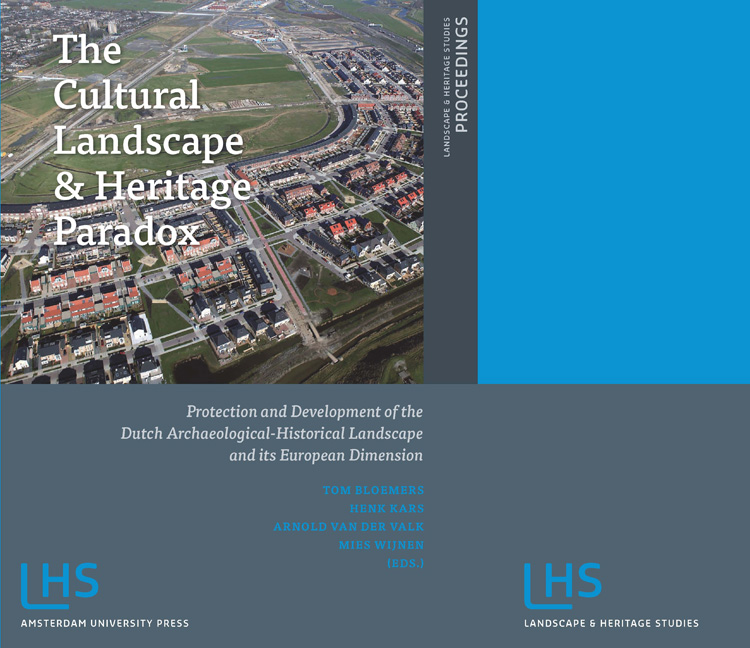 The Cultural Landscape and Heritage Paradox
The Cultural Landscape and Heritage Paradox Book contents
- Frontmatter
- Contents
- Preface
- I INTRODUCTION
- II INSIGHTS AND PROSPECTS OF ARCHAEOLOGICAL-HISTORICAL LANDSCAPE STUDIES
- III LINKING KNOWLEDGE AND ACTION
- IV IMAGINATION - FACTS AND CONSTRUCTIONS
- V SHARING KNOWLEDGE - STORIES, MAPS AND DESIGN
- VI SYNTHESIS AND CONCLUSIONS
- VII MANAGEMENT OF KNOWLEDGE
- VIII AGENDA FOR THE FUTURE
- IX SUMMARY
- X APPENDIX
- Subject Index
- Index of Places and Regions
1 - Imagination: facts and Constructions. About Imagination, Authenticity and Identity, and the value of Interpretative Heritage Research
Published online by Cambridge University Press: 21 January 2021
- Frontmatter
- Contents
- Preface
- I INTRODUCTION
- II INSIGHTS AND PROSPECTS OF ARCHAEOLOGICAL-HISTORICAL LANDSCAPE STUDIES
- III LINKING KNOWLEDGE AND ACTION
- IV IMAGINATION - FACTS AND CONSTRUCTIONS
- V SHARING KNOWLEDGE - STORIES, MAPS AND DESIGN
- VI SYNTHESIS AND CONCLUSIONS
- VII MANAGEMENT OF KNOWLEDGE
- VIII AGENDA FOR THE FUTURE
- IX SUMMARY
- X APPENDIX
- Subject Index
- Index of Places and Regions
Summary
ABSTRACT
This introduction reflects on three themes selected from the contributions in this section: imagination, authenticity and identity, and interpretative heritage research.
Imagination covers facts and constructions and their relationship. The tension between these can be understood by adopting the concepts of ‘superstructure’ and ‘infrastructure’. In our case, superstructure is the ‘narration’ of the archaeological-historical landscape story by applying the metaphor of ‘biography of landscape’, infrastructure is the methodical way towards this narration, exploring the sources. Action research creates a platform to apply these concepts for linking (the production) of facts and constructions.
Authenticity and identity represent aims, effects or outcomes of imagination and are expressed by images of the archaeological-historical landscape. They are constructs with a dynamic and fluid character related to the time and the context they belong to. In the specific context of linking cultural-historical heritage, planning and design various concepts are available to assess this heritage, namely the biography of landscape, protection by development, the canon and historic landscape characterization. Identity is a key notion in the interaction between practice and imagination.
Interpretative heritage research is the reflection on the way people relate to past elements and structures. Issues like effectiveness of implementations, transparency of procedures, attracting public interest or the closure and openness of the system can ‘further the democratization of heritage policy’. The introduction of the Valletta Convention in the Netherlands and its effects on the role of amateur archaeologists, self- and hetero-reference and the value of a philosophy of science for the heritage disciplines show that more basic reflective issues can also be the subject of interpretative research.
Finally the issue of the ethics of pragmatism is introduced as an urgently needed condition to frame heritage studies and management within modern society.
KEY WORDS
Imagination; authenticity, identity; interpretative heritage research; self- and hetero-reference, reactivity, ethics
INTRODUCTION
The core theme of this section is ‘imagination’. Imagination as used in this section primarily covers the ‘images’ of the archaeological-historical landscape, the images themselves and the process of creating and perceiving these images, i.e. imagination in and about the past, the present and the future.
- Type
- Chapter
- Information
- The Cultural Landscape and Heritage ParadoxProtection and Development of the Dutch Archaeological-Historical Landscape and its European Dimension, pp. 189 - 202Publisher: Amsterdam University PressPrint publication year: 2010
- 1
- Cited by
